Alcohol Effect on Bariatric Bypass Surgery
VerifiedAdded on 2023/06/03
|12
|3477
|211
AI Summary
This research paper discusses the effects of alcohol on bariatric bypass surgery, including the pharmacokinetic effects of bariatric surgery on alcohol metabolism. It also covers the problems and considerations for special populations, as well as alcohol treatment for special populations.
Contribute Materials
Your contribution can guide someone’s learning journey. Share your
documents today.
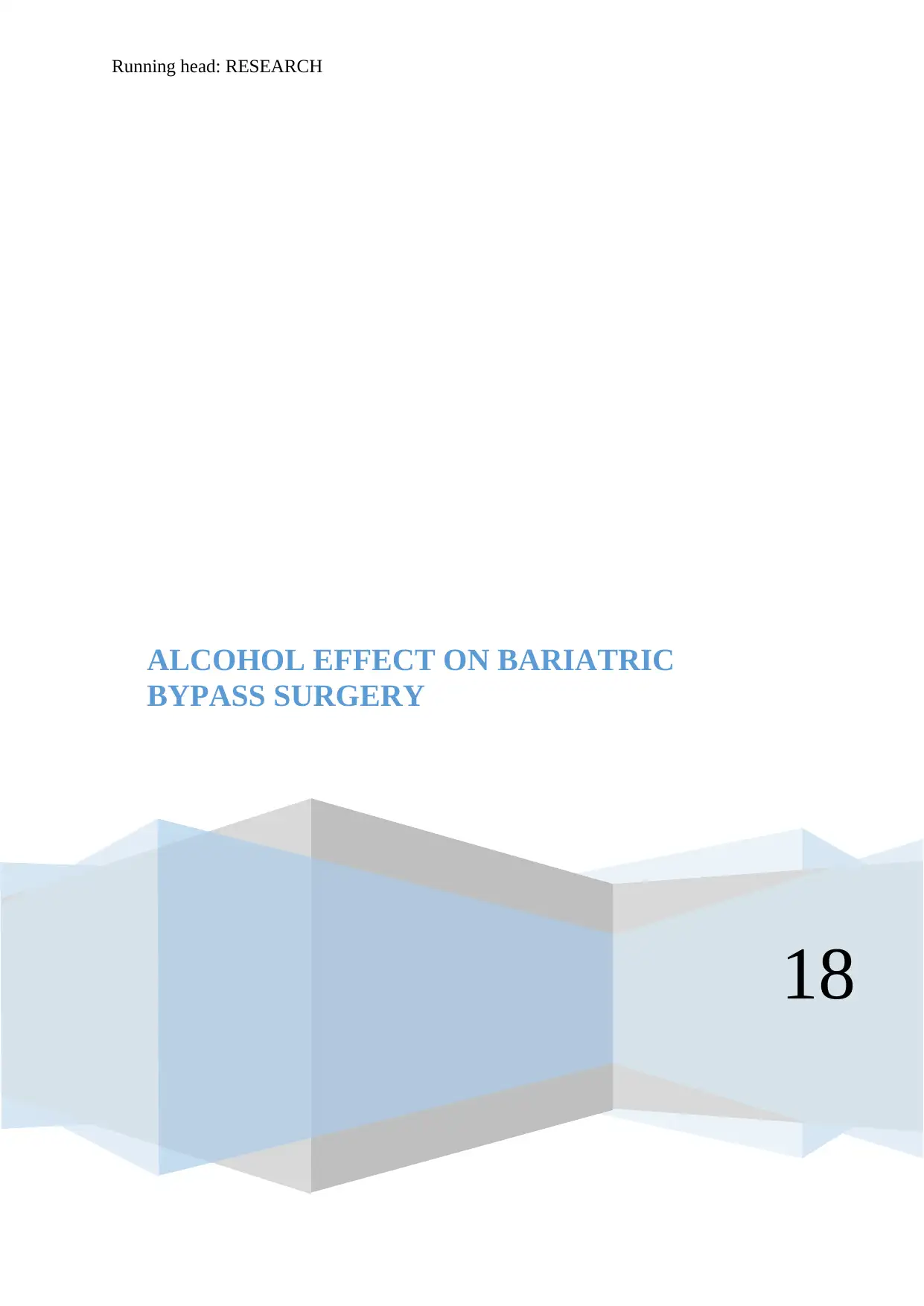
Running head: RESEARCH
18
ALCOHOL EFFECT ON BARIATRIC
BYPASS SURGERY
18
ALCOHOL EFFECT ON BARIATRIC
BYPASS SURGERY
Secure Best Marks with AI Grader
Need help grading? Try our AI Grader for instant feedback on your assignments.
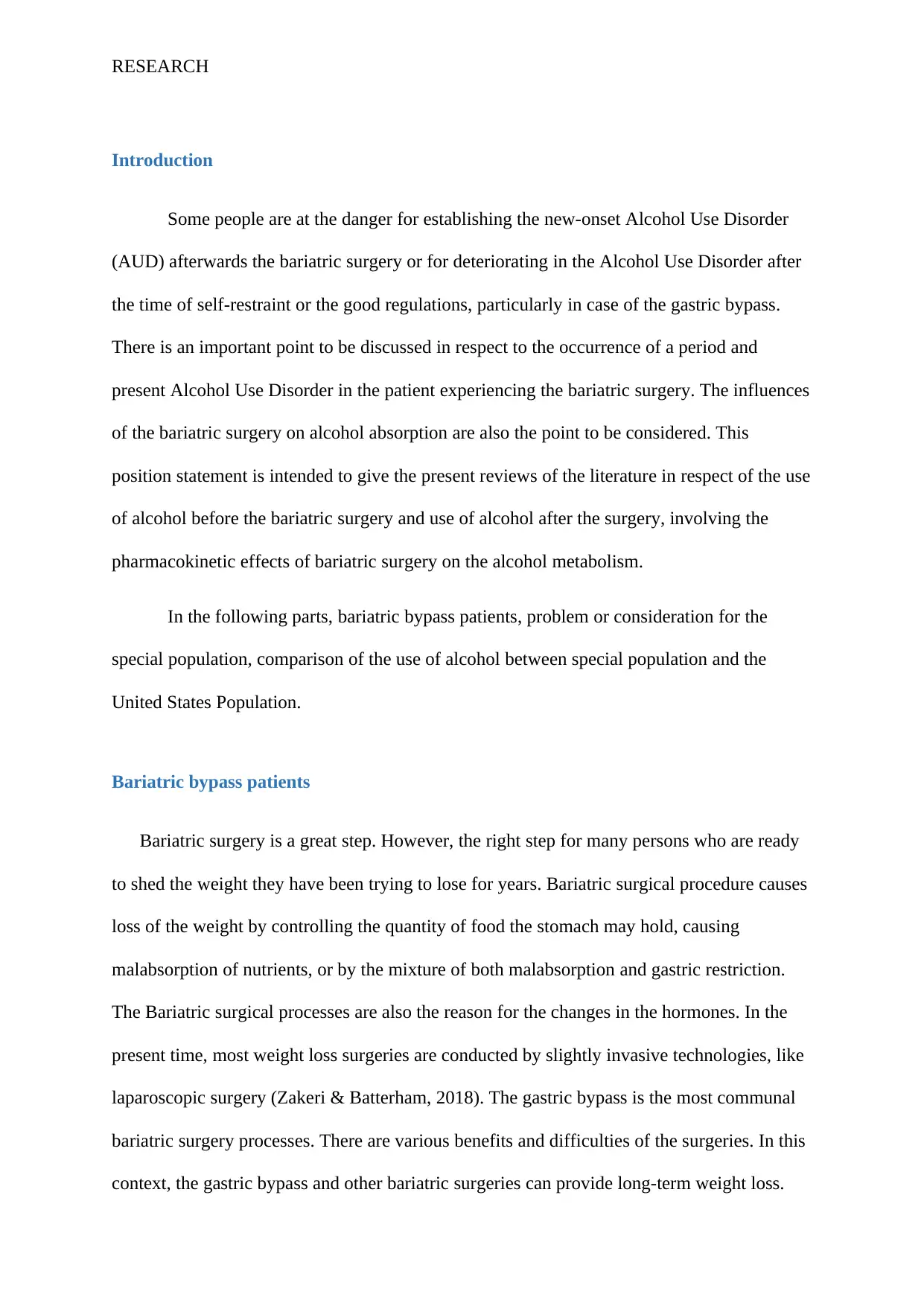
RESEARCH
Introduction
Some people are at the danger for establishing the new-onset Alcohol Use Disorder
(AUD) afterwards the bariatric surgery or for deteriorating in the Alcohol Use Disorder after
the time of self-restraint or the good regulations, particularly in case of the gastric bypass.
There is an important point to be discussed in respect to the occurrence of a period and
present Alcohol Use Disorder in the patient experiencing the bariatric surgery. The influences
of the bariatric surgery on alcohol absorption are also the point to be considered. This
position statement is intended to give the present reviews of the literature in respect of the use
of alcohol before the bariatric surgery and use of alcohol after the surgery, involving the
pharmacokinetic effects of bariatric surgery on the alcohol metabolism.
In the following parts, bariatric bypass patients, problem or consideration for the
special population, comparison of the use of alcohol between special population and the
United States Population.
Bariatric bypass patients
Bariatric surgery is a great step. However, the right step for many persons who are ready
to shed the weight they have been trying to lose for years. Bariatric surgical procedure causes
loss of the weight by controlling the quantity of food the stomach may hold, causing
malabsorption of nutrients, or by the mixture of both malabsorption and gastric restriction.
The Bariatric surgical processes are also the reason for the changes in the hormones. In the
present time, most weight loss surgeries are conducted by slightly invasive technologies, like
laparoscopic surgery (Zakeri & Batterham, 2018). The gastric bypass is the most communal
bariatric surgery processes. There are various benefits and difficulties of the surgeries. In this
context, the gastric bypass and other bariatric surgeries can provide long-term weight loss.
Introduction
Some people are at the danger for establishing the new-onset Alcohol Use Disorder
(AUD) afterwards the bariatric surgery or for deteriorating in the Alcohol Use Disorder after
the time of self-restraint or the good regulations, particularly in case of the gastric bypass.
There is an important point to be discussed in respect to the occurrence of a period and
present Alcohol Use Disorder in the patient experiencing the bariatric surgery. The influences
of the bariatric surgery on alcohol absorption are also the point to be considered. This
position statement is intended to give the present reviews of the literature in respect of the use
of alcohol before the bariatric surgery and use of alcohol after the surgery, involving the
pharmacokinetic effects of bariatric surgery on the alcohol metabolism.
In the following parts, bariatric bypass patients, problem or consideration for the
special population, comparison of the use of alcohol between special population and the
United States Population.
Bariatric bypass patients
Bariatric surgery is a great step. However, the right step for many persons who are ready
to shed the weight they have been trying to lose for years. Bariatric surgical procedure causes
loss of the weight by controlling the quantity of food the stomach may hold, causing
malabsorption of nutrients, or by the mixture of both malabsorption and gastric restriction.
The Bariatric surgical processes are also the reason for the changes in the hormones. In the
present time, most weight loss surgeries are conducted by slightly invasive technologies, like
laparoscopic surgery (Zakeri & Batterham, 2018). The gastric bypass is the most communal
bariatric surgery processes. There are various benefits and difficulties of the surgeries. In this
context, the gastric bypass and other bariatric surgeries can provide long-term weight loss.
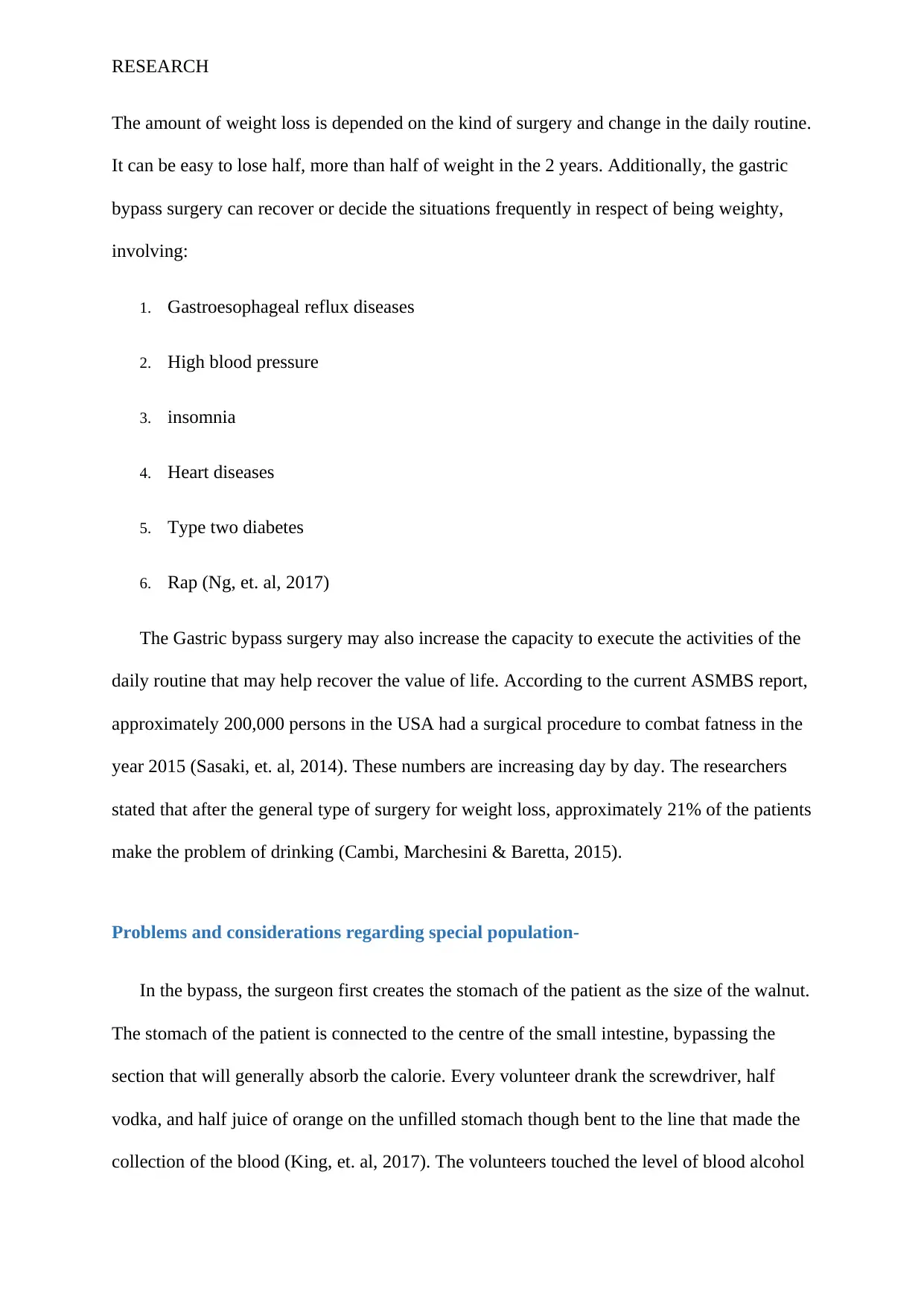
RESEARCH
The amount of weight loss is depended on the kind of surgery and change in the daily routine.
It can be easy to lose half, more than half of weight in the 2 years. Additionally, the gastric
bypass surgery can recover or decide the situations frequently in respect of being weighty,
involving:
1. Gastroesophageal reflux diseases
2. High blood pressure
3. insomnia
4. Heart diseases
5. Type two diabetes
6. Rap (Ng, et. al, 2017)
The Gastric bypass surgery may also increase the capacity to execute the activities of the
daily routine that may help recover the value of life. According to the current ASMBS report,
approximately 200,000 persons in the USA had a surgical procedure to combat fatness in the
year 2015 (Sasaki, et. al, 2014). These numbers are increasing day by day. The researchers
stated that after the general type of surgery for weight loss, approximately 21% of the patients
make the problem of drinking (Cambi, Marchesini & Baretta, 2015).
Problems and considerations regarding special population-
In the bypass, the surgeon first creates the stomach of the patient as the size of the walnut.
The stomach of the patient is connected to the centre of the small intestine, bypassing the
section that will generally absorb the calorie. Every volunteer drank the screwdriver, half
vodka, and half juice of orange on the unfilled stomach though bent to the line that made the
collection of the blood (King, et. al, 2017). The volunteers touched the level of blood alcohol
The amount of weight loss is depended on the kind of surgery and change in the daily routine.
It can be easy to lose half, more than half of weight in the 2 years. Additionally, the gastric
bypass surgery can recover or decide the situations frequently in respect of being weighty,
involving:
1. Gastroesophageal reflux diseases
2. High blood pressure
3. insomnia
4. Heart diseases
5. Type two diabetes
6. Rap (Ng, et. al, 2017)
The Gastric bypass surgery may also increase the capacity to execute the activities of the
daily routine that may help recover the value of life. According to the current ASMBS report,
approximately 200,000 persons in the USA had a surgical procedure to combat fatness in the
year 2015 (Sasaki, et. al, 2014). These numbers are increasing day by day. The researchers
stated that after the general type of surgery for weight loss, approximately 21% of the patients
make the problem of drinking (Cambi, Marchesini & Baretta, 2015).
Problems and considerations regarding special population-
In the bypass, the surgeon first creates the stomach of the patient as the size of the walnut.
The stomach of the patient is connected to the centre of the small intestine, bypassing the
section that will generally absorb the calorie. Every volunteer drank the screwdriver, half
vodka, and half juice of orange on the unfilled stomach though bent to the line that made the
collection of the blood (King, et. al, 2017). The volunteers touched the level of blood alcohol
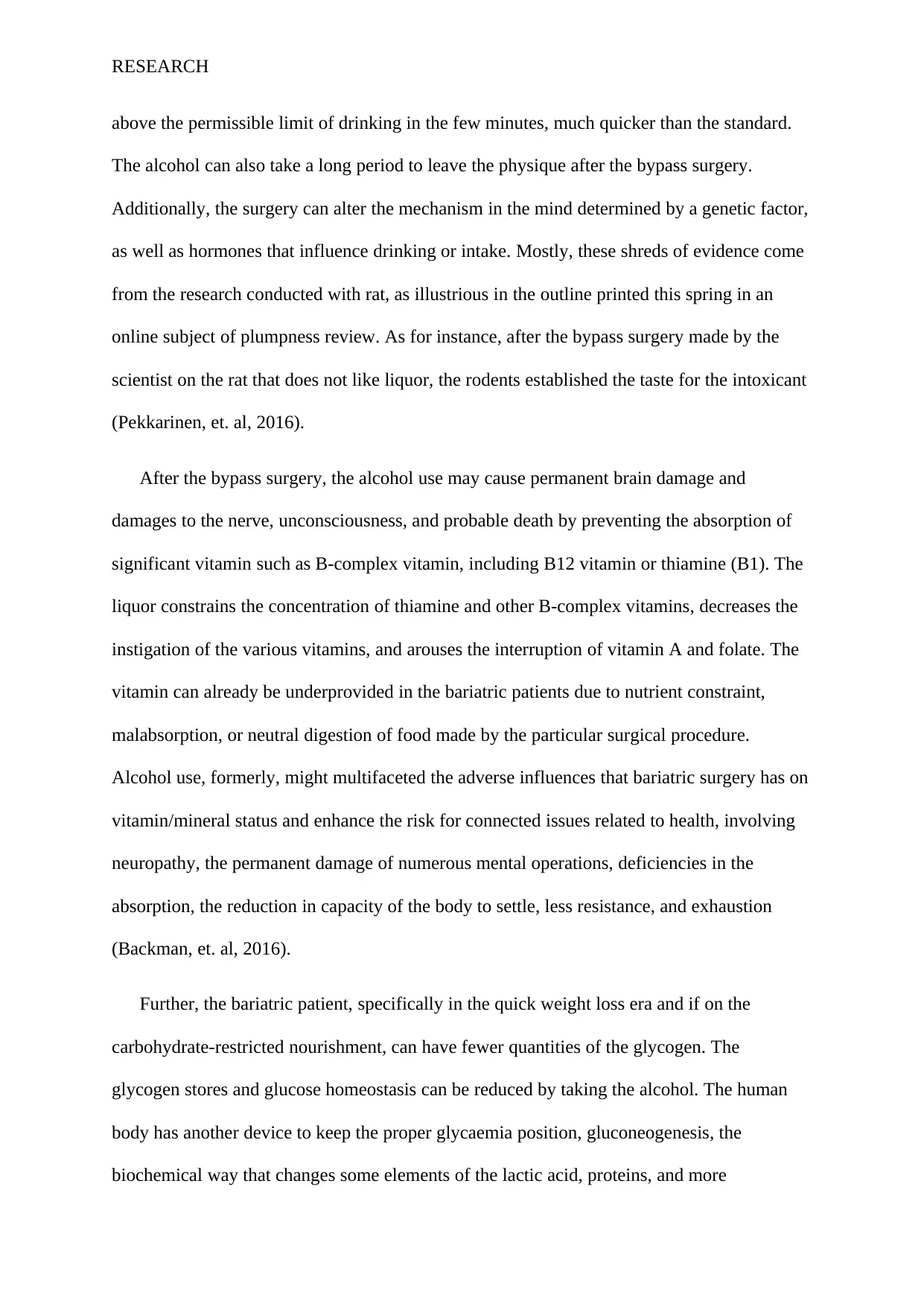
RESEARCH
above the permissible limit of drinking in the few minutes, much quicker than the standard.
The alcohol can also take a long period to leave the physique after the bypass surgery.
Additionally, the surgery can alter the mechanism in the mind determined by a genetic factor,
as well as hormones that influence drinking or intake. Mostly, these shreds of evidence come
from the research conducted with rat, as illustrious in the outline printed this spring in an
online subject of plumpness review. As for instance, after the bypass surgery made by the
scientist on the rat that does not like liquor, the rodents established the taste for the intoxicant
(Pekkarinen, et. al, 2016).
After the bypass surgery, the alcohol use may cause permanent brain damage and
damages to the nerve, unconsciousness, and probable death by preventing the absorption of
significant vitamin such as B-complex vitamin, including B12 vitamin or thiamine (B1). The
liquor constrains the concentration of thiamine and other B-complex vitamins, decreases the
instigation of the various vitamins, and arouses the interruption of vitamin A and folate. The
vitamin can already be underprovided in the bariatric patients due to nutrient constraint,
malabsorption, or neutral digestion of food made by the particular surgical procedure.
Alcohol use, formerly, might multifaceted the adverse influences that bariatric surgery has on
vitamin/mineral status and enhance the risk for connected issues related to health, involving
neuropathy, the permanent damage of numerous mental operations, deficiencies in the
absorption, the reduction in capacity of the body to settle, less resistance, and exhaustion
(Backman, et. al, 2016).
Further, the bariatric patient, specifically in the quick weight loss era and if on the
carbohydrate-restricted nourishment, can have fewer quantities of the glycogen. The
glycogen stores and glucose homeostasis can be reduced by taking the alcohol. The human
body has another device to keep the proper glycaemia position, gluconeogenesis, the
biochemical way that changes some elements of the lactic acid, proteins, and more
above the permissible limit of drinking in the few minutes, much quicker than the standard.
The alcohol can also take a long period to leave the physique after the bypass surgery.
Additionally, the surgery can alter the mechanism in the mind determined by a genetic factor,
as well as hormones that influence drinking or intake. Mostly, these shreds of evidence come
from the research conducted with rat, as illustrious in the outline printed this spring in an
online subject of plumpness review. As for instance, after the bypass surgery made by the
scientist on the rat that does not like liquor, the rodents established the taste for the intoxicant
(Pekkarinen, et. al, 2016).
After the bypass surgery, the alcohol use may cause permanent brain damage and
damages to the nerve, unconsciousness, and probable death by preventing the absorption of
significant vitamin such as B-complex vitamin, including B12 vitamin or thiamine (B1). The
liquor constrains the concentration of thiamine and other B-complex vitamins, decreases the
instigation of the various vitamins, and arouses the interruption of vitamin A and folate. The
vitamin can already be underprovided in the bariatric patients due to nutrient constraint,
malabsorption, or neutral digestion of food made by the particular surgical procedure.
Alcohol use, formerly, might multifaceted the adverse influences that bariatric surgery has on
vitamin/mineral status and enhance the risk for connected issues related to health, involving
neuropathy, the permanent damage of numerous mental operations, deficiencies in the
absorption, the reduction in capacity of the body to settle, less resistance, and exhaustion
(Backman, et. al, 2016).
Further, the bariatric patient, specifically in the quick weight loss era and if on the
carbohydrate-restricted nourishment, can have fewer quantities of the glycogen. The
glycogen stores and glucose homeostasis can be reduced by taking the alcohol. The human
body has another device to keep the proper glycaemia position, gluconeogenesis, the
biochemical way that changes some elements of the lactic acid, proteins, and more
Secure Best Marks with AI Grader
Need help grading? Try our AI Grader for instant feedback on your assignments.
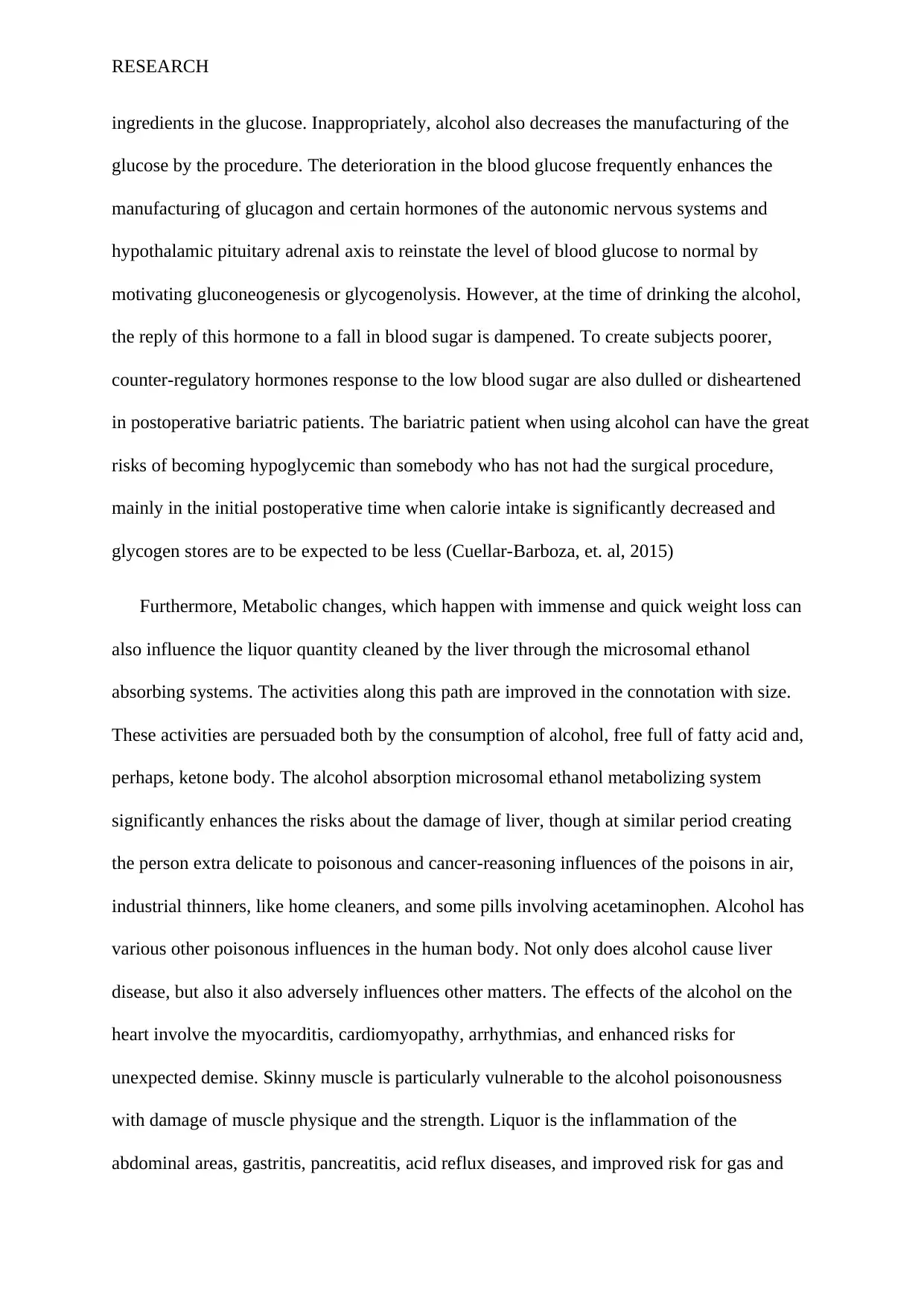
RESEARCH
ingredients in the glucose. Inappropriately, alcohol also decreases the manufacturing of the
glucose by the procedure. The deterioration in the blood glucose frequently enhances the
manufacturing of glucagon and certain hormones of the autonomic nervous systems and
hypothalamic pituitary adrenal axis to reinstate the level of blood glucose to normal by
motivating gluconeogenesis or glycogenolysis. However, at the time of drinking the alcohol,
the reply of this hormone to a fall in blood sugar is dampened. To create subjects poorer,
counter-regulatory hormones response to the low blood sugar are also dulled or disheartened
in postoperative bariatric patients. The bariatric patient when using alcohol can have the great
risks of becoming hypoglycemic than somebody who has not had the surgical procedure,
mainly in the initial postoperative time when calorie intake is significantly decreased and
glycogen stores are to be expected to be less (Cuellar-Barboza, et. al, 2015)
Furthermore, Metabolic changes, which happen with immense and quick weight loss can
also influence the liquor quantity cleaned by the liver through the microsomal ethanol
absorbing systems. The activities along this path are improved in the connotation with size.
These activities are persuaded both by the consumption of alcohol, free full of fatty acid and,
perhaps, ketone body. The alcohol absorption microsomal ethanol metabolizing system
significantly enhances the risks about the damage of liver, though at similar period creating
the person extra delicate to poisonous and cancer-reasoning influences of the poisons in air,
industrial thinners, like home cleaners, and some pills involving acetaminophen. Alcohol has
various other poisonous influences in the human body. Not only does alcohol cause liver
disease, but also it also adversely influences other matters. The effects of the alcohol on the
heart involve the myocarditis, cardiomyopathy, arrhythmias, and enhanced risks for
unexpected demise. Skinny muscle is particularly vulnerable to the alcohol poisonousness
with damage of muscle physique and the strength. Liquor is the inflammation of the
abdominal areas, gastritis, pancreatitis, acid reflux diseases, and improved risk for gas and
ingredients in the glucose. Inappropriately, alcohol also decreases the manufacturing of the
glucose by the procedure. The deterioration in the blood glucose frequently enhances the
manufacturing of glucagon and certain hormones of the autonomic nervous systems and
hypothalamic pituitary adrenal axis to reinstate the level of blood glucose to normal by
motivating gluconeogenesis or glycogenolysis. However, at the time of drinking the alcohol,
the reply of this hormone to a fall in blood sugar is dampened. To create subjects poorer,
counter-regulatory hormones response to the low blood sugar are also dulled or disheartened
in postoperative bariatric patients. The bariatric patient when using alcohol can have the great
risks of becoming hypoglycemic than somebody who has not had the surgical procedure,
mainly in the initial postoperative time when calorie intake is significantly decreased and
glycogen stores are to be expected to be less (Cuellar-Barboza, et. al, 2015)
Furthermore, Metabolic changes, which happen with immense and quick weight loss can
also influence the liquor quantity cleaned by the liver through the microsomal ethanol
absorbing systems. The activities along this path are improved in the connotation with size.
These activities are persuaded both by the consumption of alcohol, free full of fatty acid and,
perhaps, ketone body. The alcohol absorption microsomal ethanol metabolizing system
significantly enhances the risks about the damage of liver, though at similar period creating
the person extra delicate to poisonous and cancer-reasoning influences of the poisons in air,
industrial thinners, like home cleaners, and some pills involving acetaminophen. Alcohol has
various other poisonous influences in the human body. Not only does alcohol cause liver
disease, but also it also adversely influences other matters. The effects of the alcohol on the
heart involve the myocarditis, cardiomyopathy, arrhythmias, and enhanced risks for
unexpected demise. Skinny muscle is particularly vulnerable to the alcohol poisonousness
with damage of muscle physique and the strength. Liquor is the inflammation of the
abdominal areas, gastritis, pancreatitis, acid reflux diseases, and improved risk for gas and
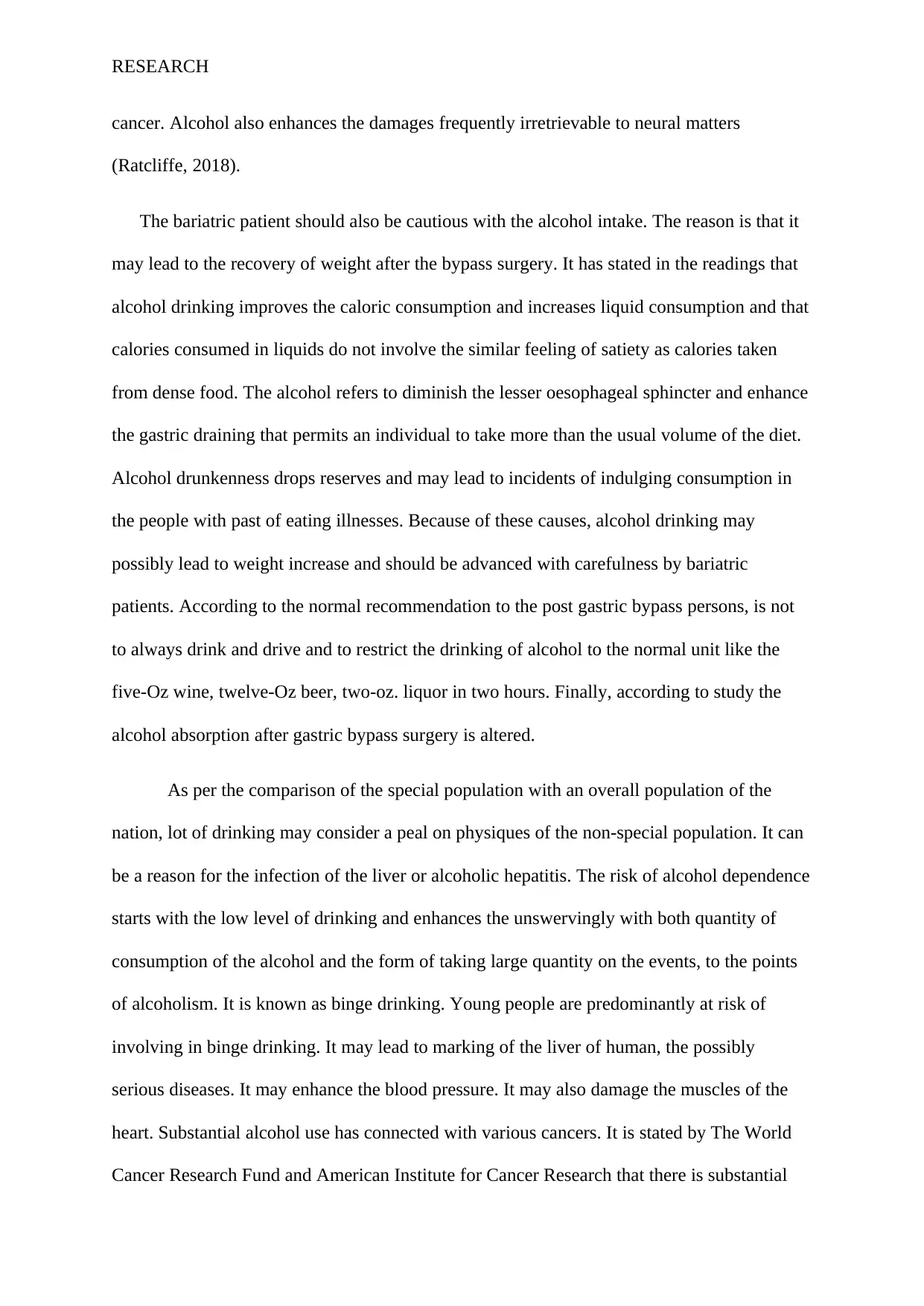
RESEARCH
cancer. Alcohol also enhances the damages frequently irretrievable to neural matters
(Ratcliffe, 2018).
The bariatric patient should also be cautious with the alcohol intake. The reason is that it
may lead to the recovery of weight after the bypass surgery. It has stated in the readings that
alcohol drinking improves the caloric consumption and increases liquid consumption and that
calories consumed in liquids do not involve the similar feeling of satiety as calories taken
from dense food. The alcohol refers to diminish the lesser oesophageal sphincter and enhance
the gastric draining that permits an individual to take more than the usual volume of the diet.
Alcohol drunkenness drops reserves and may lead to incidents of indulging consumption in
the people with past of eating illnesses. Because of these causes, alcohol drinking may
possibly lead to weight increase and should be advanced with carefulness by bariatric
patients. According to the normal recommendation to the post gastric bypass persons, is not
to always drink and drive and to restrict the drinking of alcohol to the normal unit like the
five-Oz wine, twelve-Oz beer, two-oz. liquor in two hours. Finally, according to study the
alcohol absorption after gastric bypass surgery is altered.
As per the comparison of the special population with an overall population of the
nation, lot of drinking may consider a peal on physiques of the non-special population. It can
be a reason for the infection of the liver or alcoholic hepatitis. The risk of alcohol dependence
starts with the low level of drinking and enhances the unswervingly with both quantity of
consumption of the alcohol and the form of taking large quantity on the events, to the points
of alcoholism. It is known as binge drinking. Young people are predominantly at risk of
involving in binge drinking. It may lead to marking of the liver of human, the possibly
serious diseases. It may enhance the blood pressure. It may also damage the muscles of the
heart. Substantial alcohol use has connected with various cancers. It is stated by The World
Cancer Research Fund and American Institute for Cancer Research that there is substantial
cancer. Alcohol also enhances the damages frequently irretrievable to neural matters
(Ratcliffe, 2018).
The bariatric patient should also be cautious with the alcohol intake. The reason is that it
may lead to the recovery of weight after the bypass surgery. It has stated in the readings that
alcohol drinking improves the caloric consumption and increases liquid consumption and that
calories consumed in liquids do not involve the similar feeling of satiety as calories taken
from dense food. The alcohol refers to diminish the lesser oesophageal sphincter and enhance
the gastric draining that permits an individual to take more than the usual volume of the diet.
Alcohol drunkenness drops reserves and may lead to incidents of indulging consumption in
the people with past of eating illnesses. Because of these causes, alcohol drinking may
possibly lead to weight increase and should be advanced with carefulness by bariatric
patients. According to the normal recommendation to the post gastric bypass persons, is not
to always drink and drive and to restrict the drinking of alcohol to the normal unit like the
five-Oz wine, twelve-Oz beer, two-oz. liquor in two hours. Finally, according to study the
alcohol absorption after gastric bypass surgery is altered.
As per the comparison of the special population with an overall population of the
nation, lot of drinking may consider a peal on physiques of the non-special population. It can
be a reason for the infection of the liver or alcoholic hepatitis. The risk of alcohol dependence
starts with the low level of drinking and enhances the unswervingly with both quantity of
consumption of the alcohol and the form of taking large quantity on the events, to the points
of alcoholism. It is known as binge drinking. Young people are predominantly at risk of
involving in binge drinking. It may lead to marking of the liver of human, the possibly
serious diseases. It may enhance the blood pressure. It may also damage the muscles of the
heart. Substantial alcohol use has connected with various cancers. It is stated by The World
Cancer Research Fund and American Institute for Cancer Research that there is substantial
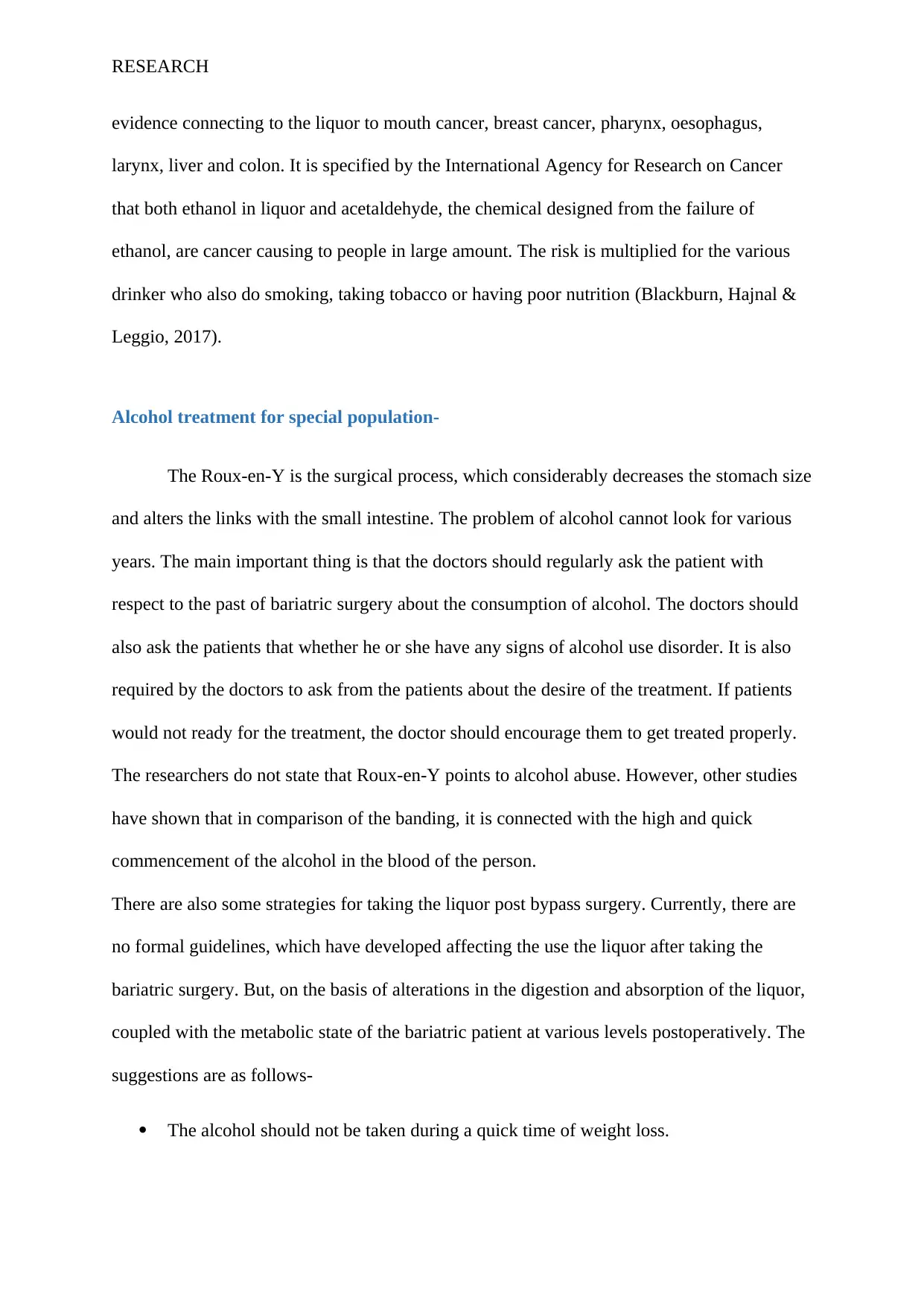
RESEARCH
evidence connecting to the liquor to mouth cancer, breast cancer, pharynx, oesophagus,
larynx, liver and colon. It is specified by the International Agency for Research on Cancer
that both ethanol in liquor and acetaldehyde, the chemical designed from the failure of
ethanol, are cancer causing to people in large amount. The risk is multiplied for the various
drinker who also do smoking, taking tobacco or having poor nutrition (Blackburn, Hajnal &
Leggio, 2017).
Alcohol treatment for special population-
The Roux-en-Y is the surgical process, which considerably decreases the stomach size
and alters the links with the small intestine. The problem of alcohol cannot look for various
years. The main important thing is that the doctors should regularly ask the patient with
respect to the past of bariatric surgery about the consumption of alcohol. The doctors should
also ask the patients that whether he or she have any signs of alcohol use disorder. It is also
required by the doctors to ask from the patients about the desire of the treatment. If patients
would not ready for the treatment, the doctor should encourage them to get treated properly.
The researchers do not state that Roux-en-Y points to alcohol abuse. However, other studies
have shown that in comparison of the banding, it is connected with the high and quick
commencement of the alcohol in the blood of the person.
There are also some strategies for taking the liquor post bypass surgery. Currently, there are
no formal guidelines, which have developed affecting the use the liquor after taking the
bariatric surgery. But, on the basis of alterations in the digestion and absorption of the liquor,
coupled with the metabolic state of the bariatric patient at various levels postoperatively. The
suggestions are as follows-
The alcohol should not be taken during a quick time of weight loss.
evidence connecting to the liquor to mouth cancer, breast cancer, pharynx, oesophagus,
larynx, liver and colon. It is specified by the International Agency for Research on Cancer
that both ethanol in liquor and acetaldehyde, the chemical designed from the failure of
ethanol, are cancer causing to people in large amount. The risk is multiplied for the various
drinker who also do smoking, taking tobacco or having poor nutrition (Blackburn, Hajnal &
Leggio, 2017).
Alcohol treatment for special population-
The Roux-en-Y is the surgical process, which considerably decreases the stomach size
and alters the links with the small intestine. The problem of alcohol cannot look for various
years. The main important thing is that the doctors should regularly ask the patient with
respect to the past of bariatric surgery about the consumption of alcohol. The doctors should
also ask the patients that whether he or she have any signs of alcohol use disorder. It is also
required by the doctors to ask from the patients about the desire of the treatment. If patients
would not ready for the treatment, the doctor should encourage them to get treated properly.
The researchers do not state that Roux-en-Y points to alcohol abuse. However, other studies
have shown that in comparison of the banding, it is connected with the high and quick
commencement of the alcohol in the blood of the person.
There are also some strategies for taking the liquor post bypass surgery. Currently, there are
no formal guidelines, which have developed affecting the use the liquor after taking the
bariatric surgery. But, on the basis of alterations in the digestion and absorption of the liquor,
coupled with the metabolic state of the bariatric patient at various levels postoperatively. The
suggestions are as follows-
The alcohol should not be taken during a quick time of weight loss.
Paraphrase This Document
Need a fresh take? Get an instant paraphrase of this document with our AI Paraphraser
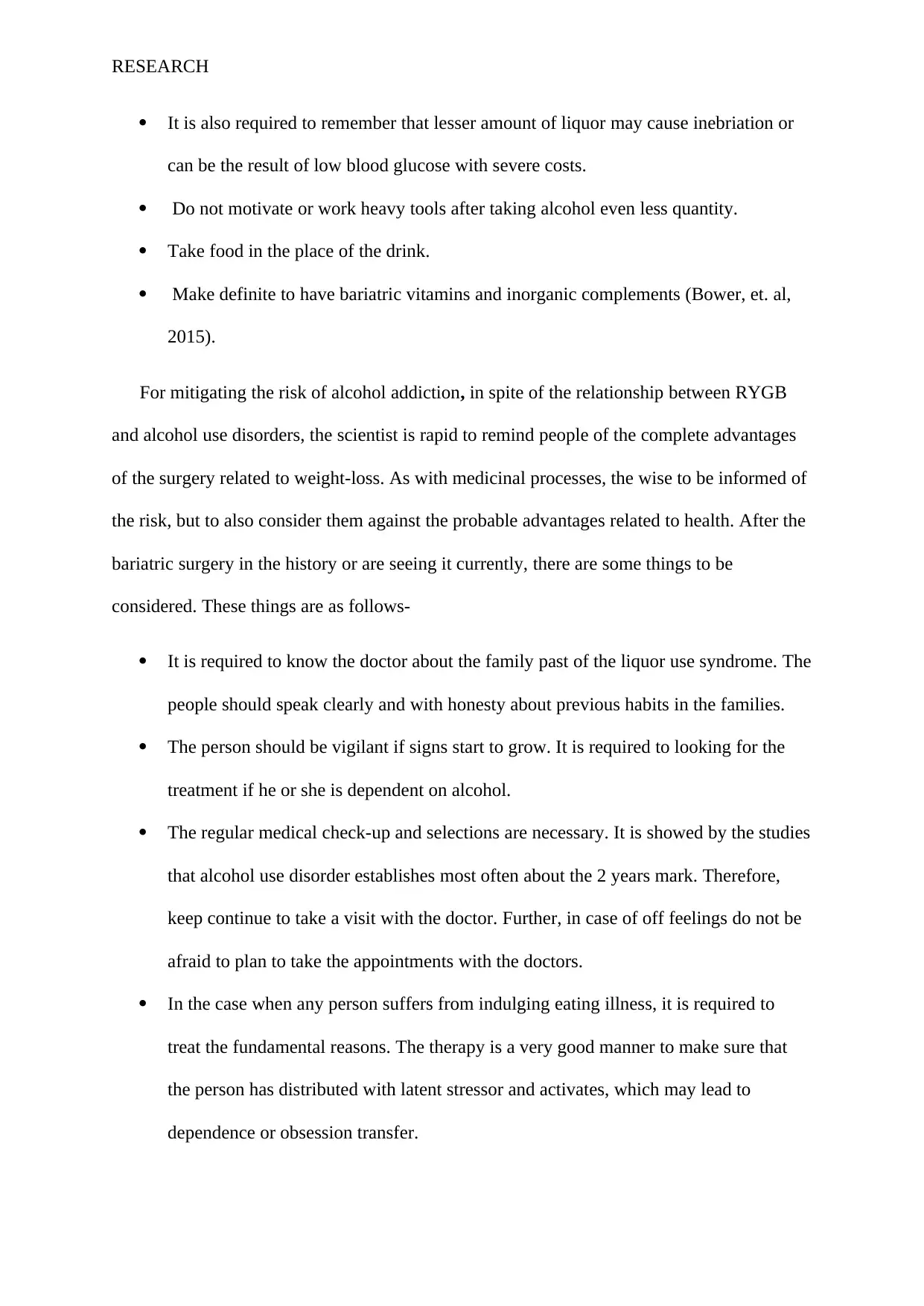
RESEARCH
It is also required to remember that lesser amount of liquor may cause inebriation or
can be the result of low blood glucose with severe costs.
Do not motivate or work heavy tools after taking alcohol even less quantity.
Take food in the place of the drink.
Make definite to have bariatric vitamins and inorganic complements (Bower, et. al,
2015).
For mitigating the risk of alcohol addiction, in spite of the relationship between RYGB
and alcohol use disorders, the scientist is rapid to remind people of the complete advantages
of the surgery related to weight-loss. As with medicinal processes, the wise to be informed of
the risk, but to also consider them against the probable advantages related to health. After the
bariatric surgery in the history or are seeing it currently, there are some things to be
considered. These things are as follows-
It is required to know the doctor about the family past of the liquor use syndrome. The
people should speak clearly and with honesty about previous habits in the families.
The person should be vigilant if signs start to grow. It is required to looking for the
treatment if he or she is dependent on alcohol.
The regular medical check-up and selections are necessary. It is showed by the studies
that alcohol use disorder establishes most often about the 2 years mark. Therefore,
keep continue to take a visit with the doctor. Further, in case of off feelings do not be
afraid to plan to take the appointments with the doctors.
In the case when any person suffers from indulging eating illness, it is required to
treat the fundamental reasons. The therapy is a very good manner to make sure that
the person has distributed with latent stressor and activates, which may lead to
dependence or obsession transfer.
It is also required to remember that lesser amount of liquor may cause inebriation or
can be the result of low blood glucose with severe costs.
Do not motivate or work heavy tools after taking alcohol even less quantity.
Take food in the place of the drink.
Make definite to have bariatric vitamins and inorganic complements (Bower, et. al,
2015).
For mitigating the risk of alcohol addiction, in spite of the relationship between RYGB
and alcohol use disorders, the scientist is rapid to remind people of the complete advantages
of the surgery related to weight-loss. As with medicinal processes, the wise to be informed of
the risk, but to also consider them against the probable advantages related to health. After the
bariatric surgery in the history or are seeing it currently, there are some things to be
considered. These things are as follows-
It is required to know the doctor about the family past of the liquor use syndrome. The
people should speak clearly and with honesty about previous habits in the families.
The person should be vigilant if signs start to grow. It is required to looking for the
treatment if he or she is dependent on alcohol.
The regular medical check-up and selections are necessary. It is showed by the studies
that alcohol use disorder establishes most often about the 2 years mark. Therefore,
keep continue to take a visit with the doctor. Further, in case of off feelings do not be
afraid to plan to take the appointments with the doctors.
In the case when any person suffers from indulging eating illness, it is required to
treat the fundamental reasons. The therapy is a very good manner to make sure that
the person has distributed with latent stressor and activates, which may lead to
dependence or obsession transfer.
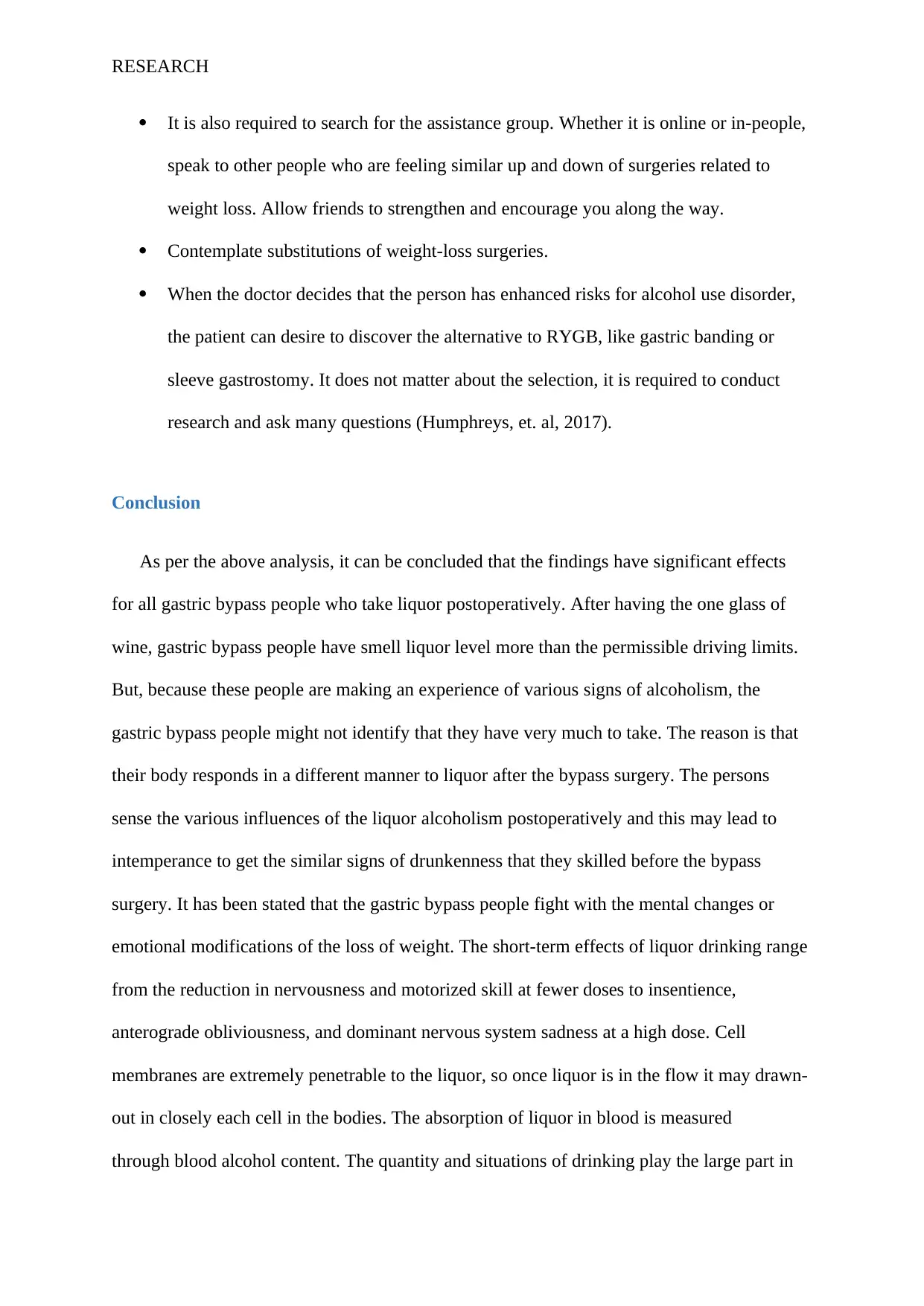
RESEARCH
It is also required to search for the assistance group. Whether it is online or in-people,
speak to other people who are feeling similar up and down of surgeries related to
weight loss. Allow friends to strengthen and encourage you along the way.
Contemplate substitutions of weight-loss surgeries.
When the doctor decides that the person has enhanced risks for alcohol use disorder,
the patient can desire to discover the alternative to RYGB, like gastric banding or
sleeve gastrostomy. It does not matter about the selection, it is required to conduct
research and ask many questions (Humphreys, et. al, 2017).
Conclusion
As per the above analysis, it can be concluded that the findings have significant effects
for all gastric bypass people who take liquor postoperatively. After having the one glass of
wine, gastric bypass people have smell liquor level more than the permissible driving limits.
But, because these people are making an experience of various signs of alcoholism, the
gastric bypass people might not identify that they have very much to take. The reason is that
their body responds in a different manner to liquor after the bypass surgery. The persons
sense the various influences of the liquor alcoholism postoperatively and this may lead to
intemperance to get the similar signs of drunkenness that they skilled before the bypass
surgery. It has been stated that the gastric bypass people fight with the mental changes or
emotional modifications of the loss of weight. The short-term effects of liquor drinking range
from the reduction in nervousness and motorized skill at fewer doses to insentience,
anterograde obliviousness, and dominant nervous system sadness at a high dose. Cell
membranes are extremely penetrable to the liquor, so once liquor is in the flow it may drawn-
out in closely each cell in the bodies. The absorption of liquor in blood is measured
through blood alcohol content. The quantity and situations of drinking play the large part in
It is also required to search for the assistance group. Whether it is online or in-people,
speak to other people who are feeling similar up and down of surgeries related to
weight loss. Allow friends to strengthen and encourage you along the way.
Contemplate substitutions of weight-loss surgeries.
When the doctor decides that the person has enhanced risks for alcohol use disorder,
the patient can desire to discover the alternative to RYGB, like gastric banding or
sleeve gastrostomy. It does not matter about the selection, it is required to conduct
research and ask many questions (Humphreys, et. al, 2017).
Conclusion
As per the above analysis, it can be concluded that the findings have significant effects
for all gastric bypass people who take liquor postoperatively. After having the one glass of
wine, gastric bypass people have smell liquor level more than the permissible driving limits.
But, because these people are making an experience of various signs of alcoholism, the
gastric bypass people might not identify that they have very much to take. The reason is that
their body responds in a different manner to liquor after the bypass surgery. The persons
sense the various influences of the liquor alcoholism postoperatively and this may lead to
intemperance to get the similar signs of drunkenness that they skilled before the bypass
surgery. It has been stated that the gastric bypass people fight with the mental changes or
emotional modifications of the loss of weight. The short-term effects of liquor drinking range
from the reduction in nervousness and motorized skill at fewer doses to insentience,
anterograde obliviousness, and dominant nervous system sadness at a high dose. Cell
membranes are extremely penetrable to the liquor, so once liquor is in the flow it may drawn-
out in closely each cell in the bodies. The absorption of liquor in blood is measured
through blood alcohol content. The quantity and situations of drinking play the large part in

RESEARCH
deciding the scope of drunkenness, for example, eating the heavy diet before alcohol
consumption causes alcohol to take more slowly
deciding the scope of drunkenness, for example, eating the heavy diet before alcohol
consumption causes alcohol to take more slowly
Secure Best Marks with AI Grader
Need help grading? Try our AI Grader for instant feedback on your assignments.
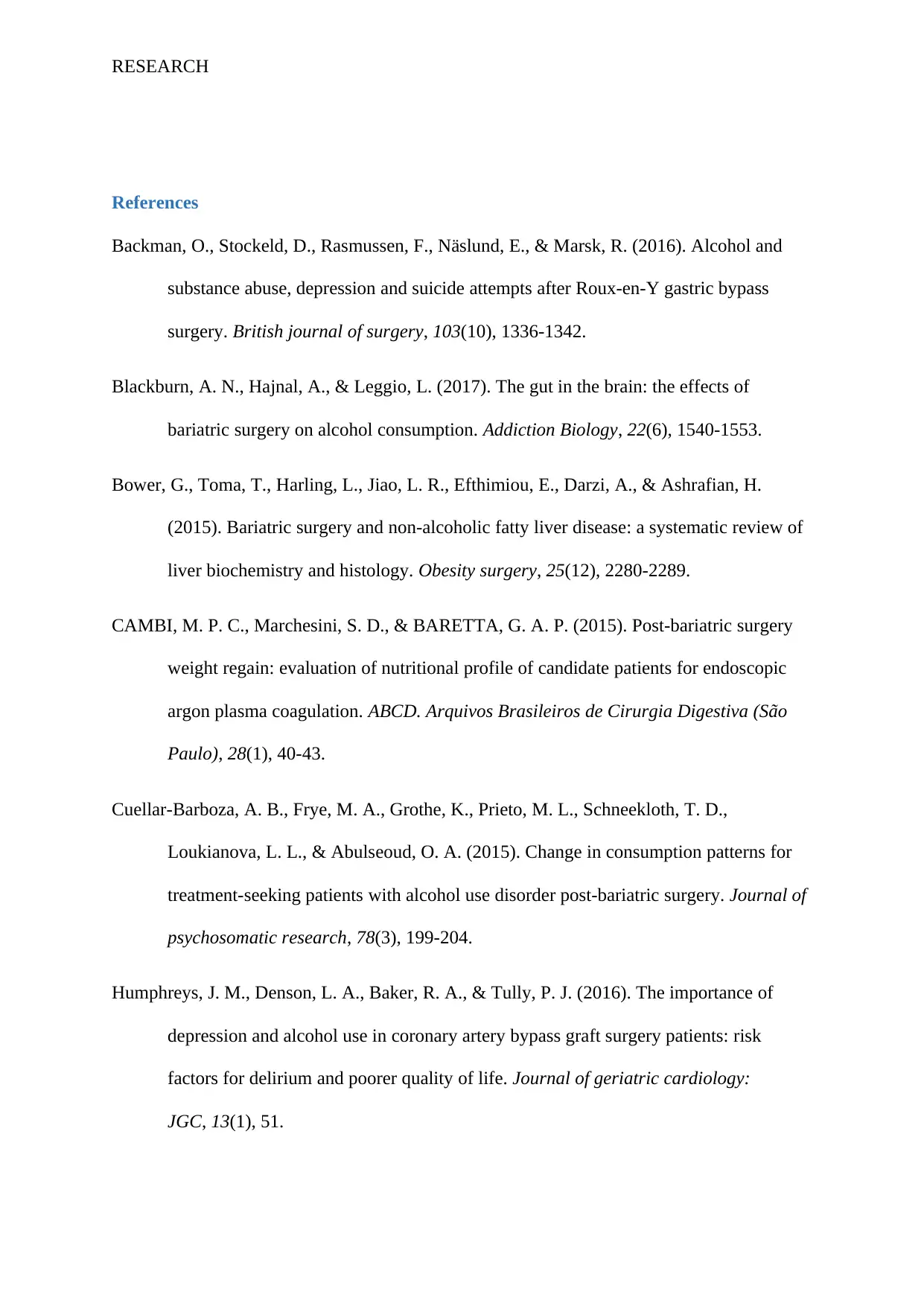
RESEARCH
References
Backman, O., Stockeld, D., Rasmussen, F., Näslund, E., & Marsk, R. (2016). Alcohol and
substance abuse, depression and suicide attempts after Roux‐en‐Y gastric bypass
surgery. British journal of surgery, 103(10), 1336-1342.
Blackburn, A. N., Hajnal, A., & Leggio, L. (2017). The gut in the brain: the effects of
bariatric surgery on alcohol consumption. Addiction Biology, 22(6), 1540-1553.
Bower, G., Toma, T., Harling, L., Jiao, L. R., Efthimiou, E., Darzi, A., & Ashrafian, H.
(2015). Bariatric surgery and non-alcoholic fatty liver disease: a systematic review of
liver biochemistry and histology. Obesity surgery, 25(12), 2280-2289.
CAMBI, M. P. C., Marchesini, S. D., & BARETTA, G. A. P. (2015). Post-bariatric surgery
weight regain: evaluation of nutritional profile of candidate patients for endoscopic
argon plasma coagulation. ABCD. Arquivos Brasileiros de Cirurgia Digestiva (São
Paulo), 28(1), 40-43.
Cuellar-Barboza, A. B., Frye, M. A., Grothe, K., Prieto, M. L., Schneekloth, T. D.,
Loukianova, L. L., & Abulseoud, O. A. (2015). Change in consumption patterns for
treatment-seeking patients with alcohol use disorder post-bariatric surgery. Journal of
psychosomatic research, 78(3), 199-204.
Humphreys, J. M., Denson, L. A., Baker, R. A., & Tully, P. J. (2016). The importance of
depression and alcohol use in coronary artery bypass graft surgery patients: risk
factors for delirium and poorer quality of life. Journal of geriatric cardiology:
JGC, 13(1), 51.
References
Backman, O., Stockeld, D., Rasmussen, F., Näslund, E., & Marsk, R. (2016). Alcohol and
substance abuse, depression and suicide attempts after Roux‐en‐Y gastric bypass
surgery. British journal of surgery, 103(10), 1336-1342.
Blackburn, A. N., Hajnal, A., & Leggio, L. (2017). The gut in the brain: the effects of
bariatric surgery on alcohol consumption. Addiction Biology, 22(6), 1540-1553.
Bower, G., Toma, T., Harling, L., Jiao, L. R., Efthimiou, E., Darzi, A., & Ashrafian, H.
(2015). Bariatric surgery and non-alcoholic fatty liver disease: a systematic review of
liver biochemistry and histology. Obesity surgery, 25(12), 2280-2289.
CAMBI, M. P. C., Marchesini, S. D., & BARETTA, G. A. P. (2015). Post-bariatric surgery
weight regain: evaluation of nutritional profile of candidate patients for endoscopic
argon plasma coagulation. ABCD. Arquivos Brasileiros de Cirurgia Digestiva (São
Paulo), 28(1), 40-43.
Cuellar-Barboza, A. B., Frye, M. A., Grothe, K., Prieto, M. L., Schneekloth, T. D.,
Loukianova, L. L., & Abulseoud, O. A. (2015). Change in consumption patterns for
treatment-seeking patients with alcohol use disorder post-bariatric surgery. Journal of
psychosomatic research, 78(3), 199-204.
Humphreys, J. M., Denson, L. A., Baker, R. A., & Tully, P. J. (2016). The importance of
depression and alcohol use in coronary artery bypass graft surgery patients: risk
factors for delirium and poorer quality of life. Journal of geriatric cardiology:
JGC, 13(1), 51.
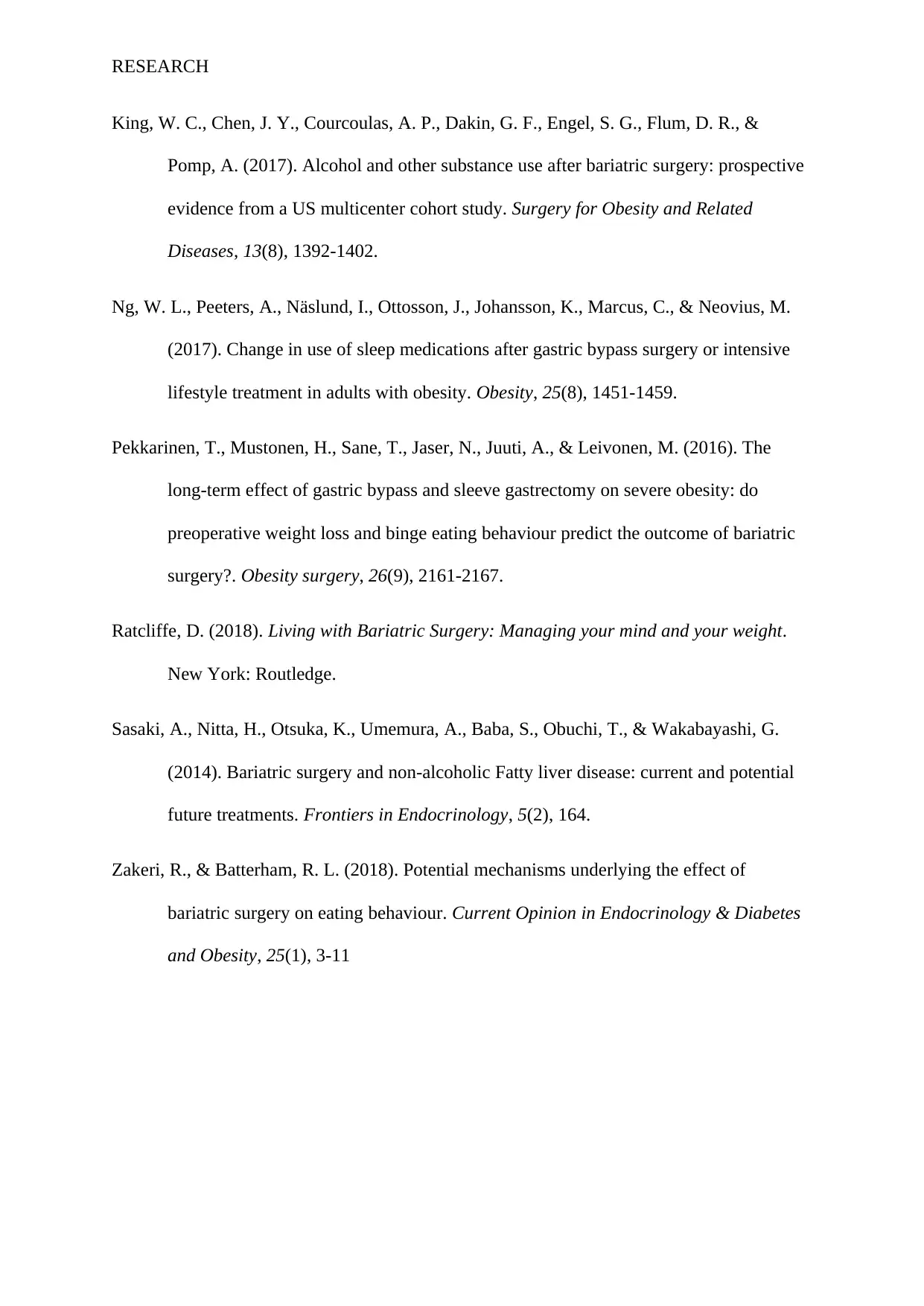
RESEARCH
King, W. C., Chen, J. Y., Courcoulas, A. P., Dakin, G. F., Engel, S. G., Flum, D. R., &
Pomp, A. (2017). Alcohol and other substance use after bariatric surgery: prospective
evidence from a US multicenter cohort study. Surgery for Obesity and Related
Diseases, 13(8), 1392-1402.
Ng, W. L., Peeters, A., Näslund, I., Ottosson, J., Johansson, K., Marcus, C., & Neovius, M.
(2017). Change in use of sleep medications after gastric bypass surgery or intensive
lifestyle treatment in adults with obesity. Obesity, 25(8), 1451-1459.
Pekkarinen, T., Mustonen, H., Sane, T., Jaser, N., Juuti, A., & Leivonen, M. (2016). The
long-term effect of gastric bypass and sleeve gastrectomy on severe obesity: do
preoperative weight loss and binge eating behaviour predict the outcome of bariatric
surgery?. Obesity surgery, 26(9), 2161-2167.
Ratcliffe, D. (2018). Living with Bariatric Surgery: Managing your mind and your weight.
New York: Routledge.
Sasaki, A., Nitta, H., Otsuka, K., Umemura, A., Baba, S., Obuchi, T., & Wakabayashi, G.
(2014). Bariatric surgery and non-alcoholic Fatty liver disease: current and potential
future treatments. Frontiers in Endocrinology, 5(2), 164.
Zakeri, R., & Batterham, R. L. (2018). Potential mechanisms underlying the effect of
bariatric surgery on eating behaviour. Current Opinion in Endocrinology & Diabetes
and Obesity, 25(1), 3-11
King, W. C., Chen, J. Y., Courcoulas, A. P., Dakin, G. F., Engel, S. G., Flum, D. R., &
Pomp, A. (2017). Alcohol and other substance use after bariatric surgery: prospective
evidence from a US multicenter cohort study. Surgery for Obesity and Related
Diseases, 13(8), 1392-1402.
Ng, W. L., Peeters, A., Näslund, I., Ottosson, J., Johansson, K., Marcus, C., & Neovius, M.
(2017). Change in use of sleep medications after gastric bypass surgery or intensive
lifestyle treatment in adults with obesity. Obesity, 25(8), 1451-1459.
Pekkarinen, T., Mustonen, H., Sane, T., Jaser, N., Juuti, A., & Leivonen, M. (2016). The
long-term effect of gastric bypass and sleeve gastrectomy on severe obesity: do
preoperative weight loss and binge eating behaviour predict the outcome of bariatric
surgery?. Obesity surgery, 26(9), 2161-2167.
Ratcliffe, D. (2018). Living with Bariatric Surgery: Managing your mind and your weight.
New York: Routledge.
Sasaki, A., Nitta, H., Otsuka, K., Umemura, A., Baba, S., Obuchi, T., & Wakabayashi, G.
(2014). Bariatric surgery and non-alcoholic Fatty liver disease: current and potential
future treatments. Frontiers in Endocrinology, 5(2), 164.
Zakeri, R., & Batterham, R. L. (2018). Potential mechanisms underlying the effect of
bariatric surgery on eating behaviour. Current Opinion in Endocrinology & Diabetes
and Obesity, 25(1), 3-11
1 out of 12
Related Documents
Your All-in-One AI-Powered Toolkit for Academic Success.
+13062052269
info@desklib.com
Available 24*7 on WhatsApp / Email
![[object Object]](/_next/static/media/star-bottom.7253800d.svg)
Unlock your academic potential
© 2024 | Zucol Services PVT LTD | All rights reserved.



